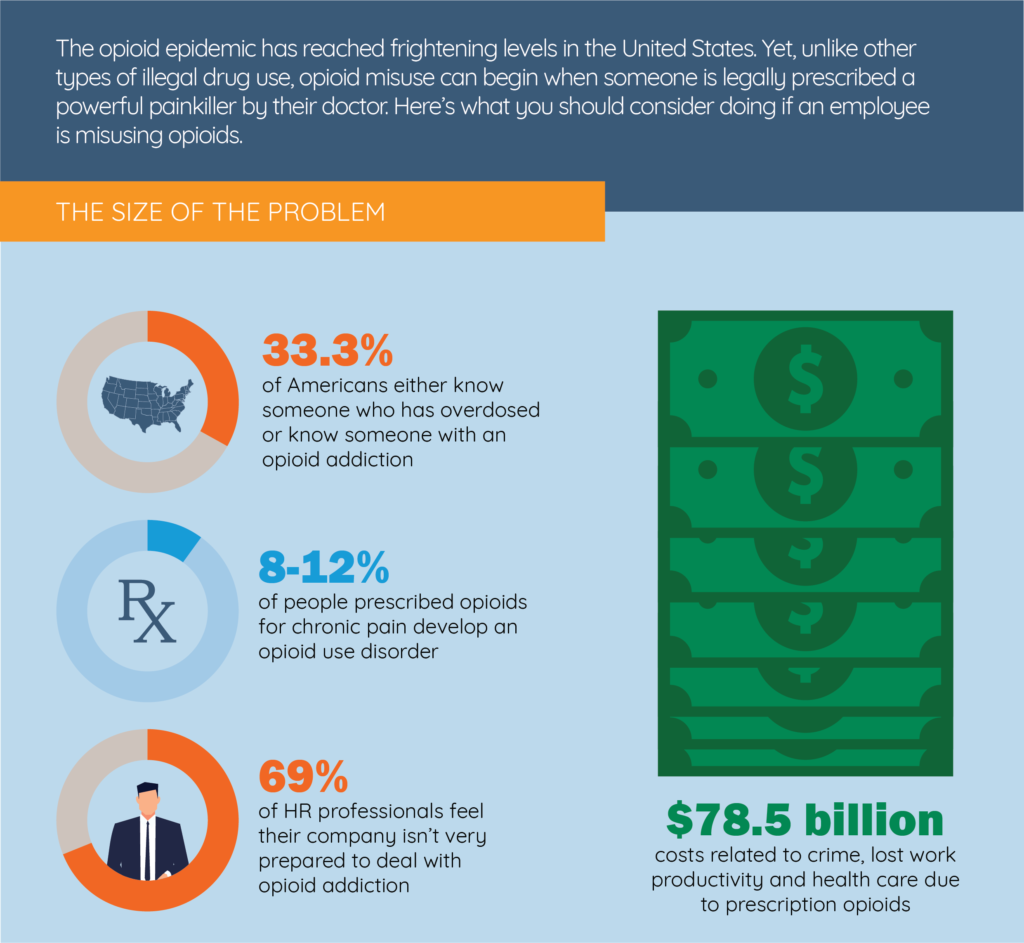The opioid epidemic has reached frightening levels, with nearly one-third of Americans knowing someone who has either overdosed or has an opioid addiction, according to NPR and Ipsos. And, unlike other types of illegal drug use, opioid misuse often begins when someone is legally prescribed a powerful painkiller, such as oxycodone or hydrocodone by their doctor. An estimated 8-12% of people prescribed opioids for chronic pain develop an opioid use disorder, according to research shared by the National Institute on Drug Abuse.
For employers, this epidemic is not only a health issue, but also a workplace issue. The total economic cost of the opioid crisis has reached an estimated $631 billion, according to the Society of Actuaries. A national survey by The Hartford found half of small businesses have been financially impacted by the opioid epidemic.
Opioid misuse can cause costly workplace injuries that can affect your workers’ compensation liability. And the opioid crisis can affect your employees’ loved ones, your customers or even your vendors. Despite these potentially high costs, only 22% of employees at small businesses said in The Hartford’s survey that they feel extremely or very knowledgeable about opioid addiction.
Employers of all sizes are wise to get ahead of this curve and learn how to navigate employee drug misuse before it arises. So, what steps should you take with an employee you know or suspect may be struggling with opioid misuse?
Although some employers might be tempted to immediately terminate someone’s employment due to potential drug misuse, that’s not generally a smart call. For one, you could be sued for discrimination under the Americans with Disabilities Act, or ADA—which classifies addiction as a disability.
Click the images to view the full infographic.


Here, then, are some steps to help you navigate the situation carefully and sensitively.
Understand the Issue—and Know Your Limits
Unless an employee has outright told you they have an addiction to opioids, it’s dangerous to assume so and confront them. Moreover, opioids could be prescribed legally and sometimes even due to work-related injuries—so employees may be taking them for legitimate reasons. (Illegal drug use, on the other hand, is not protected by the ADA.)
The Equal Employment Opportunity Commission, which enforces the ADA rules, has filed suits in recent years suggesting that employers can only inquire about an employee’s prescription medication use, including opioids, when it has reasonable suspicion that such use would interfere with the employee’s core job duties or poses a direct threat to the workplace.
It’s also important to recognize that there are all types of substances that one could be addicted to and not to single out opioid misuse. Moreover, federal health privacy laws prevent employers from inquiring about employees’ health conditions except under specific circumstances. Understand what you can ask employees about prescription drug use and consider the steps if the employee’s return to work is planned after an absence for treatment.
The best defense is to inform yourself about opioid misuse and empower your team by providing education and support resources. The U.S. Chamber of Commerce Foundation’s Sharing Solutions website offers resources and showcases innovative solutions for how businesses can combat the opioid crisis.
Lean on your benefits providers to help prevent misuse. By leveraging medical, pharmacy or workers’ compensation data, benefits providers can identify trends and address any issues early. Ask your workers’ compensation and disability insurer to outline what they are doing to prevent opioid misuse among employees protected by their insurance plans.
In case an employee is ever in an emergency situation, you can provide them with the National Emergency Hotline: 1-800-662-HELP.
Create Strong Employee Drug-Free Workplace Policies
You may reduce the odds of having legal trouble over your treatment of an employee you suspect or know is misusing opioids by having strong, written drug-free workplace policies—assuming those policies are within the bounds of federal, state, and local employment laws.
For example, the policy could explicitly prohibit employees from possessing or being under the influence of illegally obtained drugs at work and lay out what the protocols are if an employee breaks those rules. It also should spell out when and how any drug testing will be conducted. (Keep in mind that every state has its own workplace drug testing laws.)
Such a policy can require employees to disclose any prescriptions they are taking that could hinder their ability to perform their job—which may help in determining whether an employee has a prescription for opioids or takes them illegally. But, given the strict regulatory landscape around workplace drug testing and policies, make sure to get input from an employment law expert when creating your policy.
One caution: Once you have drug-use policies in place, you have to enforce them fairly so that you are not accused of discrimination.
Focus on Performance and Policies
When meeting with an employee you know or suspect is misusing opioids, it’s best to focus any discussions or corrective actions on their performance issues and violation of workplace policies—which may include the drug-use policy, if you think they have violated it.
If an employee has clearly violated a workplace policy or does not take steps to correct their performance, you may want to terminate their employment. But you should get legal guidance before you do.
Also make sure that your employees are aware of programs that may help them overcome or prevent drug misuse and understand how to use them.
An Employee Assistance Program (EAP) is one resource that you can offer to help your employees with their wellbeing, including counseling for a substance use disorder. An EAP typically provides cost-free, confidential counseling sessions and professional referrals to employees, their family members and domestic partners.
The Hartford’s survey found about half of small businesses (47%) offer an EAP to their employees. If your benefits plan includes an EAP, make sure your employees know what services the EAP offers and how to access it.
If you are among those companies without an EAP, you can check with your existing benefits providers to see if they offer services bundled with other products. For example, The Hartford offers Ability Assist counseling with its short- and long-term disability coverage. The U.S. Chamber of Commerce Foundation has a search tool where you can find resources in your state.
The Hartford’s survey found that one-third of working Americans feel the stigma associated with addiction is preventing people from seeking treatment. As an employer, you have the opportunity to take the lead on workplace cultural change and end the stigma by creating a safe place for employees to discuss addiction’s effects on employees, families and communities and find solutions for countering it.
Be Helpful and Sensitive, but Not Overly Involved
If an employee admits they have an opioid addiction, you can show sympathy and direct them to helpful resources, such as a local organization that helps people find addiction treatment services.
But don’t become personally involved in their situation, as you want to keep a distinct boundary between your employees’ personal and professional lives.
When it comes to dealing with addiction in the workplace, it’s best to have strong written policies and protocols in place, so you’re approaching any potential case in a disciplined and fair way—to protect both you and your employees.

